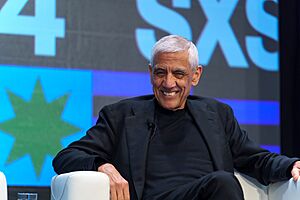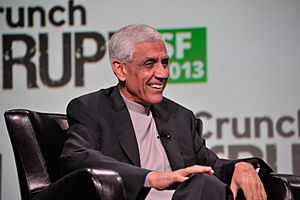Vinod Khosla facts for kids
Quick facts for kids
Vinod Khosla
|
|
|---|---|

Khosla in 2024
|
|
| Born | 28 January 1955 Pune, Bombay State, India
|
| Education | IIT Delhi (BTech) Carnegie Mellon University (MS) Stanford University (MBA) |
| Known for | Co-founder of Sun Microsystems Founder of Khosla Ventures |
| Spouse(s) | Neeru Khosla |
| Children | 4 |
Vinod Khosla (born 28 January 1955) is a very successful Indian-American businessman. He is also a venture capitalist, which means he invests money in new companies that he thinks will grow big.
Vinod Khosla helped start a famous computer company called Sun Microsystems. Later, he created his own investment firm, Khosla Ventures. He became very wealthy by investing early in areas like computer networks, software, and new energy technologies. Many people see him as one of the most important venture capitalists. In January 2025, his wealth was estimated to be around $9.2 billion.
Contents
Early Life and Education
Vinod Khosla was born on January 28, 1955, in Pune, India. His family was from the Punjabi region. His father was an officer in the Indian Army and wanted Vinod to join the army too.
Vinod went to elementary school at Mount St Mary's School (New Delhi). As a teenager, he read about how Intel was started. This made him very interested in technology and wanting to create his own business. He was inspired by Intel's co-founder, Andrew Grove.
From 1971 to 1976, Vinod studied electrical engineering at IIT Delhi. He earned a bachelor's degree there. He started the first computer club at any IIT and even ran the school's computer center for a while. He also wrote a paper about "parallel processing" before it became common in the tech world.
In 1975, Vinod tried to start a company that made soy milk. He wanted to offer a milk option for people in India who didn't have refrigerators.
Vinod then received a scholarship to study at Carnegie Mellon University. He earned a master's degree in biomedical engineering. He wanted to go to Stanford Graduate School of Business for his MBA but was rejected twice. After starting his master's at Carnegie Mellon, he convinced Stanford to accept him. He earned his MBA in 1980.
He is married to Neeru Khosla, who was his girlfriend when they were children. They have four children together.
Career Highlights
After finishing his MBA at Stanford in 1980, Vinod Khosla decided to become an entrepreneur. He turned down other job offers to start his first business.
Starting Sun Microsystems
Vinod first worked on a plan for a company that would help electrical engineers design electronics. He became the first full-time founder and Chief Financial Officer of a company called Daisy Systems. However, he left because the company spent too much on special computer hardware.
In 1982, Vinod Khosla helped create Sun Microsystems. He started it with Stanford classmates Andy Bechtolsheim and Scott McNealy. Later, UC Berkeley student Bill Joy also joined as a co-founder. Sun Microsystems sold powerful computers called servers and desktop computers.
Vinod raised $300,000 to start the company. Within five years, Sun Microsystems was making $1 billion in sales each year. Vinod was the first chairman and CEO from 1982 to 1984. He then left to become a venture capitalist.
Becoming a Venture Capitalist
In 1986, Vinod joined a well-known venture capital firm called Kleiner Perkins. As a partner, he managed investments in new technologies. These included video games and computer chips.
He helped create Nexgen, a company that made computer processors similar to Intel's. He also invested in Go Corporation, which tried to make a computer operated by a stylus. In 1994, he helped Excite create its search engine for the internet. He mentored the founders until the company was sold for $7 billion.
Vinod was also an early supporter of fiber optics and the internet for faster communication. He then focused on companies that built telecommunication networks. He helped start Juniper Networks, which made special "Internet routers." His investment of $275,000 in Juniper Networks became one of his biggest successes. He also helped start Cerent Corporation and Siara, which were sold for billions of dollars.
Founding Khosla Ventures
In 2004, Vinod decided to leave Kleiner Perkins to spend more time with his children. He also wanted to focus on investing in science-based technology startups. He founded his own firm, Khosla Ventures, that same year. He wanted to invest in more experimental technologies that could have a "social impact."
Khosla Ventures is known for investing early in companies like Square. It also invests in alternative energy technologies such as solar power, biofuels, and batteries. Vinod believes in finding big breakthroughs in "clean" energy. He thinks this is better than just trying to use less energy. The firm has invested in companies like LanzaTech (carbon recycling) and Impossible Foods (plant-based meat).
Starting in 2010, Khosla Ventures began investing in food companies. They were early investors in Instacart and DoorDash. They also focused on financial technology (fintech) companies. Early investments in Square, Stripe, and Affirm brought big returns for Khosla Ventures.
In 2012, Vinod wrote an article about how artificial intelligence (AI) could change medicine. He believed that "bionic assistance" would eventually help or even replace many doctors. He started investing in companies that use AI in medical treatments and robotics.
In 2018, Vinod shared his goal for the rest of his life. He wants to "reinvent societal infrastructure" using new technologies. This includes things like 3D-printing houses for people who need homes. He invests in "black swan" technologies. These are ideas that have a high chance of failing but could have huge benefits for the environment and society if they succeed.
Khosla Ventures was the first venture capital investor in OpenAI. They invested $50 million in OpenAI's for-profit part in 2019. Vinod also offered personal loans to startups after the collapse of Silicon Valley Bank.
When Sam Altman was briefly removed from OpenAI, Vinod strongly supported him. He wanted Altman to be brought back. Khosla Ventures manages about $15 billion in investments.
His Beliefs and Views
Views on Capitalism and Society
Vinod Khosla believes that capitalism can help solve social problems. He thinks it can create solutions that work on a large scale. He also believes that machine learning technology will change many jobs. While it might increase differences in income, he thinks it will also create enough wealth for everyone to have a basic income.
Political Views
Vinod Khosla supports politicians based on their climate policies. He is a Democrat and has given money to groups that support left-leaning politics. He has hosted fundraising dinners for Barack Obama and Joe Biden. In 2016, he supported Hillary Clinton for president.
He was a big supporter of "Yes on 87" in California. This was a campaign to pass a clean energy law in 2006, but it did not pass. In July 2024, he pledged his support for Kamala Harris and joined "VCs for Kamala."
Views on Global Relations
In May 2023, Vinod talked about how the Russian invasion of Ukraine and the COVID-19 pandemic changed the future. He said the Ukraine invasion started a shift towards new energy. He also said that COVID-19 lockdowns in China caused global supply chains to move out of the country.
He believes America is in a "techno-economic war" with China. He thinks America would lose if it slowed down AI development. He also believes that very advanced AI should be kept private for national security reasons. In April 2024, he wrote an article supporting a bill that would make TikTok separate from its parent company, ByteDance. He called TikTok a "weapon of war."
Thoughts on Artificial Intelligence
Vinod Khosla has written a lot about artificial intelligence (AI). He believes AI will increase wealth and productivity. He also thinks that human skills will become even more valuable as AI expands.
While some worry that AI will take away jobs, Vinod argues it will free people to do what they truly enjoy. He believes that 80 percent of all jobs could be changed by AI. He thinks AI's growth will allow for a universal basic income for everyone. In October 2024, he wrote about AI being a powerful force that could create a world of plenty. He believes a positive outcome is possible with careful planning.
Giving Back and Other Activities
Vinod Khosla has been involved in many charitable activities. He was an honorary chair for the DonorsChoose advisory board in the San Francisco Bay Area. In 2000, he received the Golden Plate Award from the American Academy of Achievement.
In 2006, his wife Neeru Khosla helped start the CK-12 Foundation. This foundation creates free, open-source textbooks to lower education costs worldwide. Vinod and his wife have also donated $500,000 to the Wikimedia Foundation.
In 2007, Vinod won the EY Entrepreneur of the Year award for Northern California. He was also on the board of trustees for the Blum Center at the University of California, Berkeley. This center works to solve extreme poverty and disease in developing countries.
He is one of the founders of TiE, The Indus Entrepreneurs. He has also worked with Muhammad Yunus, funding organizations that provide small loans to businesses in developing countries. Vinod is on the Board of Trustees at Carnegie Mellon University. He is also part of the Giving Pledge, where wealthy people promise to give away most of their money.
In April 2021, Vinod offered to pay for oxygen imports for hospitals in India during the COVID-19 pandemic.
The Martins Beach Story
Since 2010, Vinod Khosla has been in a legal disagreement about public access to Martins Beach. This beach is south of Half Moon Bay, California. Vinod owns the land next to the beach. After he bought the property, he blocked public access with a gate and guards. He also painted over the welcome sign.
Martins Beach used to be a popular spot for families and surfers. In August 2017, a California court ruled that Vinod must allow public access again. In October 2018, the US Supreme Court decided not to hear his appeal.
However, in November 2018, another court found that the previous owners of the property had not meant for access to Martins Beach to be public. In January 2020, the California Coastal Commission sued Vinod. They said he was breaking a law about coastal access.
See also
 In Spanish: Vinod Khosla para niños
In Spanish: Vinod Khosla para niños
 | Bessie Coleman |
 | Spann Watson |
 | Jill E. Brown |
 | Sherman W. White |


